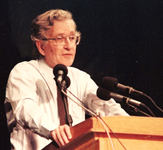|

 Write Date : 10-12-08 13:02
Write Date : 10-12-08 13:02
|
논문 발표 Page 3 한국 영어교육 학회 학술지
|
 |
|
Writer :
관리자
 View : 2,449
|
|
II. LANGUAGE ACQUISITION

We acquire complex knowledge of the structure of our first language
automatically by engaging in natural meaningful communication,
as Ellis (1994) has noted. Yet even linguists have not succeeded in
giving a fully explicit description of this knowledge. By way of
illustration, Ellis proposes: “[A]sk a young child how to form a plural
and she says she does not know; ask her ‘here is a wug, here is
another wug, what have you got?’ and she is able to reply, ‘two wugs’”
(Ellis, 1994, p. 2).
Even though the child was not explicitly aware of the grammatical rules governing
inflectional morphemes, she was still able to respond correctly.
Krashen (1981, 1983) views observations of this sort as evidence that language is
acquired by understanding what is said or written, not how it is said or written.
Invoking the Language Acquisition Device (hereafter LAD) originally postulated
by Chomsky (1965, 1980), Krashen argues that a person “ … does not simply acquire what he hears [or reads]--there is a significant contribution of the … [LAD which] …
itself generates possible rules according to innate procedures … . Moreover,
not all comprehended input reaches the LAD” (1985, pp. 2, 3), an
effect that Krashen accounts for by postulating an affective filter--a kind of mental
block: “When … [the filter] is ‘up’, [e.g.] when the acquirer is unmotivated, lacking in
self-confidence, when he is ‘on the defensive’ … he may understand what he hears
and reads, but the input will not reach the LAD. …The filter is down when the acquirer is not concerned with the possibility of failure in language acquisition. …
[It] is lowest when the acquirer is so involved in the message that he temporarily
‘forgets’ he is … reading ” (1985, pp. 3-4). This sort of ‘forgetting’ is likely to
occur when a person is reading something he chose because of his interest in its topic, i.e. when his reading is done voluntarily.
|
|
 |